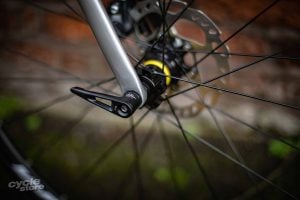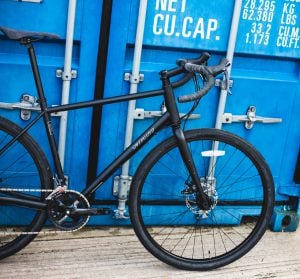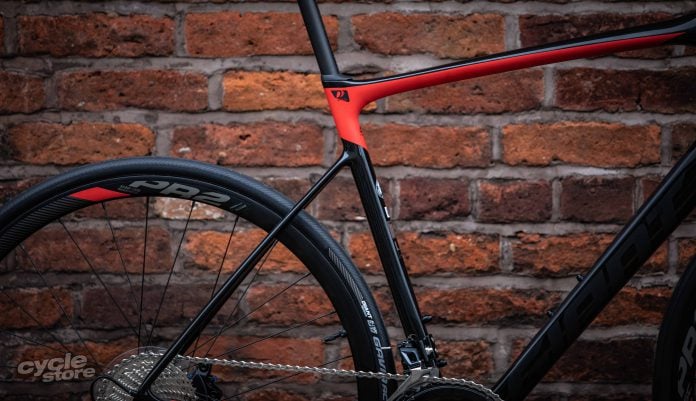An ongoing battle since the release of the disc brake road bike into the tour a couple of years ago. You’re in the market for a new bike, but you’re not sure which to choose. Do you go disc, or rim? Well there isn’t an easy answer for you, but we’ve listed some of the things you might want to consider in the blog below.
 Disc brakes have become more and more common on road bikes through the last few seasons, and we’ve now even started to see them make an appearance in the time trial world. Disc brakes feature on cars and motorbikes, so this superior braking technology should also work on our road bikes too, right?
Disc brakes have become more and more common on road bikes through the last few seasons, and we’ve now even started to see them make an appearance in the time trial world. Disc brakes feature on cars and motorbikes, so this superior braking technology should also work on our road bikes too, right?
— HOW TO HIT YOUR 2019 GOALS —
Well they certainly have their pros and cons. Disc brakes offer superior breaking in the wet if you’re running carbon rims, they let the rims last longer and make the bike much more durable. Disc brakes get a lot hotter a lot quicker, and can lose the friction easily. Not to mention a disc brake bike comes with an added cost to it’s rim brake equivalent. And arguably, a rim brake is a disc brake, it’s just using a 700C rim (your wheel), instead of a small disc in the centre.
 Though a rim brake also has to stretch around the tyre, so the callipers are much bigger than those on a disc brake. Though the wider the rim/tyre gets, the less effective the rim brake will be. So as we see professionals and road cyclists move towards wider tyres such as a 32mm, the disc becomes a much more viable option. Whereas a rim brake will only cater for a 28mm option.
Though a rim brake also has to stretch around the tyre, so the callipers are much bigger than those on a disc brake. Though the wider the rim/tyre gets, the less effective the rim brake will be. So as we see professionals and road cyclists move towards wider tyres such as a 32mm, the disc becomes a much more viable option. Whereas a rim brake will only cater for a 28mm option.
Disc brakes can be known to grab at the brakes as you slow down. Lurching you forward and not offering the smooth stopping motion of a rim brake. Though this isn’t always a bad thing, this is just because of the added friction the discs offer.
— 8 THINGS TO KNOW ABOUT AN ALL ADVENTURE ROAD BIKE —
Wet Weather:
 When the rain is coming down, it’s a clear choice. And for the British weather, this isn’t uncommon. A disc brake will offer a smoother, more consistent stop. You won’t get the squeal of a rim brake in the wet, or the panic when you hit the bottom of the hill. This will also limit the damage done to the rim when the gritty roads get debris into the pads. And you can’t beat the simplicity of a good, old fashioned cable calliper.
When the rain is coming down, it’s a clear choice. And for the British weather, this isn’t uncommon. A disc brake will offer a smoother, more consistent stop. You won’t get the squeal of a rim brake in the wet, or the panic when you hit the bottom of the hill. This will also limit the damage done to the rim when the gritty roads get debris into the pads. And you can’t beat the simplicity of a good, old fashioned cable calliper.
If you’re set for warm weather rides year round, then a rim brake version may suit you. It’ll be cheaper and easier to buy and run, and may suit your aesthetic choice. Though if you see some slippy days, a disc brake will offer you much more security and longevity in the bike.
— WHY YOU NEED A NEW BIKE FIT —
Cost:
 Rim brakes come at a cheaper price when you’re looking at a new bike, and it’s often around £50 cheaper. This is because the frames are more difficult to produce as all the braking force is on one side rather than down the centre of the wheel. Also thru-axles are now used on disc break bikes with come at an added cost to normal, although disc options are getting lighter and cheaper year on year.
Rim brakes come at a cheaper price when you’re looking at a new bike, and it’s often around £50 cheaper. This is because the frames are more difficult to produce as all the braking force is on one side rather than down the centre of the wheel. Also thru-axles are now used on disc break bikes with come at an added cost to normal, although disc options are getting lighter and cheaper year on year.
The consumables are much cheaper on the rim brake version, the pads are cheaper and easier to replace, though you may need to replace them more often. A lot of people will argue that newer disc brakes are also cheap and easy to maintain, but issues can be a much more difficult affair.
Anyone (or almost anyone) will be able to unscrew a rim brake calliper, slide on another and retighten. Though a disc brake can come with more complicated issues such as moving the pistons and re-aligning the brakes.
Braking Force:
 Disc brakes are much easier to use, especially in the cold weather when your hands are struggling. You can come to a halt with one finger on the brakes. A rim brake will need solid force to make sure that you come to a stop. The tyres will be the limiting factor to your stopping distance on a disc brake bike, even in bad conditions.
Disc brakes are much easier to use, especially in the cold weather when your hands are struggling. You can come to a halt with one finger on the brakes. A rim brake will need solid force to make sure that you come to a stop. The tyres will be the limiting factor to your stopping distance on a disc brake bike, even in bad conditions.
If you ride with panniers on the bike full of all sorts of junk, or love an off-road adventure, then discs will offer you the force you need to stop. When you move to 32C or bigger tyres with the weight on the back, it becomes a no brainer to make sure that you can stop yourself.
Verdict:
Are rim brakes the best to bring you to a halt? Definitely not. But if they do everything you need them to, why would you go for disc brakes? If you spend a lot of your time riding in the cold, wet, British conditions, then we’d recommend the extra money for disc brakes. Unless you spend your winter miles on the turbo. But if you’re more about old school style riding on the continent, rim brakes are the one for you.
To shop our range of road bikes – click here.








